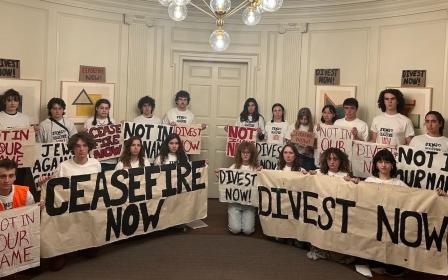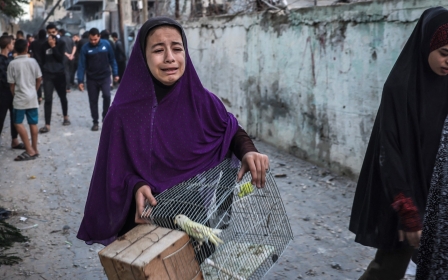Israel-Palestine war: Qatar says Gaza ceasefire will start on Friday morning

A truce between Israel and Hamas in Gaza will start on Friday at 7am, local time, with the first batch of hostages to be released at 4pm, a spokesman for Qatar's foreign ministry said on Thursday.
During a news conference in Doha, Majed al-Ansari fleshed out details of the agreement, which Qatar has mediated.
“Those hostages who are from the same families will be put together within the same batch,” said Ansari.
Over a period of four days Hamas is expected to release 50 Israelis. Up to 150 Palestinians held in Israeli prisons will also be freed in exchange.
“Obviously every day will include a number of civilians as agreed to total 50 within the four days,” Ansari said.
Stay informed with MEE's newsletters
Sign up to get the latest alerts, insights and analysis, starting with Turkey Unpacked
The Qatari spokesman said that Egyptian, Israeli and Hamas officials had worked out the synchronisation of the exchange of captives "to create a safe environment for the release of hostages".
Ansari says he cannot disclose information about the routes the captives will take out of Gaza for “security reasons”.
“Our main objective here is the safety of the hostages,” he told reporters, adding that there will be collaboration with the Red Cross and the parties to the conflict reflecting the logistical nightmare the process is likely to be.
Asked about the non-Israelis held by Hamas, Ansari said the criteria for whom to release were “purely humanitarian”, with a focus on getting women and children out first.
Ansari also stressed that humanitarian aid is “an integral part” of the deal, adding that “we are expecting aid to go in as soon as possible from the Rafah crossing”.
“It will be a fraction of the need in Gaza. The need is so great in Gaza,” he said, adding that “of course, our aim is for this deal to end with a lasting truce”.
Firstly women and children
When asked how many Palestinian prisoners will be released on Friday, Ansari said he couldn’t disclose that information “but I can tell you that the deal is reciprocal, so we’re expecting a release to happen also on the Israeli side at around 4pm”.
Ansari told reporters that the lists with the names “are a day-by-day process".
“Whenever we have both lists confirmed, this is when we can begin with the process of getting the people out. But there is an agreement with the time intervals,” he added.
The first list of Israelis will include 13 individuals - women and children - who will be released at approximately 4pm on Friday, said Ansari.
“That will be happening every day within a specific window of time where the situation will be much safer for them to move about. They will be handed over to the Red Cross,” he said.
When asked what would constitute a breakdown or a violation of the truce, Ansar said that “the agreement is about full cessation of hostilities within the four days. So obviously any resumption of hostilities of any kind would be a breach.”
Ansari said that lines of communication between the two sides will remain open so that any possible breach is communicated quickly so the deal doesn’t break down.
When asked if the deal would mean a cessation of hostilities on other fronts including ongoing skirmishes between Israel and Hezbollah in Lebanon or the Houthis in Yemen, Ansari said the pause covers “only the Gaza Strip”.
Ansari was also asked about whether the current discussions reflected a desire for a more permanent ceasefire between Israel and Hamas, to which he said that “what we have felt is that they are committed to this highly”.
“Our aim is to reach this agreement and to pave the way for more pauses that can put an end to this war that everyone is suffering from. Hopefully, the end will be very soon and we need to build this and that in order to reach a lasting permanent ceasefire,” he added.
Middle East Eye delivers independent and unrivalled coverage and analysis of the Middle East, North Africa and beyond. To learn more about republishing this content and the associated fees, please fill out this form. More about MEE can be found here.





